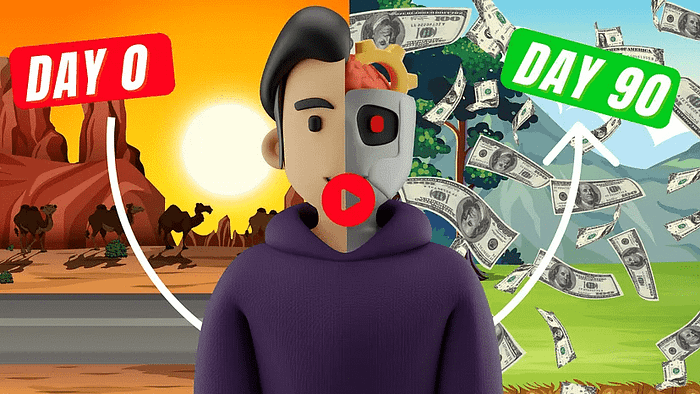15 Things Poor People Think Are Wasteful But Make You Richer: A Path to Financial Freedom
Breaking free from the mindset of poor people often requires understanding that certain investments, though seemingly extravagant at first glance, can pave the way to lasting wealth and financial freedom. Through careful analysis and years of observing successful individuals, I’ve discovered that transforming your financial situation isn’t just about earning more – it’s about strategically investing in yourself and your future.
We strongly recommend that you check out our guide on how to take advantage of AI in today’s passive income economy.
Table of Contents
Understanding the Wealth Mindset
The journey from scarcity to abundance begins with recognizing that many poor people unknowingly limit their potential by avoiding crucial investments. While living paycheck to paycheck might feel like the only option, the path to financial freedom often requires a fundamental shift in how we view spending versus investing. This transformation starts with acknowledging that certain expenditures, though appearing wasteful at first, can yield substantial returns over time.
The Power of Strategic Investment
Time to think stands as the cornerstone of financial transformation. In my experience, I’ve observed that poor people often feel trapped in a constant cycle of work and survival, viewing any pause for reflection as wasted time. However, this mental space for strategic planning and reflection serves as the foundation for every successful financial decision. Creating intentional breaks in your daily routine, even just 30 minutes of uninterrupted thinking time, can spark innovative solutions to long-standing financial challenges.
Building Financial Security
Emergency funds represent another crucial investment that many poor people overlook. The psychology behind avoiding emergency savings often stems from the belief that every dollar should address immediate needs. However, this protective financial buffer prevents minor setbacks from becoming major financial catastrophes. Starting with just $50 per month can gradually build a safety net that breaks the cycle of debt and financial instability.
High-Value Skills and Personal Development
Investing in high-income skills might seem daunting to poor people struggling with daily expenses. Yet, the digital age has democratized access to education through online platforms, making it possible to learn valuable skills like programming, digital marketing, or data analysis at fraction of traditional costs. These investments in personal development can exponentially increase earning potential and create multiple income streams.
The Foundation of Success
Quality sleep emerges as a non-negotiable investment that poor people often sacrifice in pursuit of extra working hours. The relationship between rest and financial success isn’t immediately obvious, but adequate sleep enhances decision-making abilities, creativity, and problem-solving skills – all crucial elements for building wealth. Creating a comfortable sleeping environment and maintaining consistent sleep schedules can significantly impact your financial trajectory.
Professional Presentation and Opportunity
The impact of quality clothing extends far beyond mere appearance. While poor people might view designer or high-quality garments as unnecessary luxuries, professional attire serves as a powerful tool for career advancement and networking opportunities. Investing in a few key, well-made pieces can create lasting impressions in professional settings and actually save money over time by reducing the need for frequent replacements.
Transportation and Mobility
Reliable transportation represents another area where poor people often choose immediate savings over long-term benefits. A dependable vehicle, though requiring a larger initial investment, can prevent costly repairs, reduce commute times, and open up better job opportunities. The key lies in viewing transportation as an investment in reliability and opportunity rather than just an expense.
Time Management and Delegation
The concept of hiring help often makes poor people uncomfortable, viewing it as an unnecessary luxury. However, strategic delegation of time-consuming tasks can free up valuable hours for skill development, side businesses, or career advancement. This multiplication of productive time through careful outsourcing can accelerate wealth creation and break the cycle of poverty.
Mental Space and Growth
Creating quiet spaces for reflection and focus might seem impossible for poor people living in crowded conditions. Yet, this investment in mental clarity – whether through noise-cancelling headphones or finding peaceful public spaces – can dramatically improve decision-making and creative problem-solving abilities. The ability to think clearly in a quiet environment often leads to breakthrough ideas and solutions.
Knowledge and Education
While poor people might hesitate to spend money on books and education, these investments provide some of the highest returns possible. Reading materials, whether physical or digital, offer access to centuries of accumulated wisdom and practical strategies for wealth creation. The knowledge gained from targeted reading can prevent costly mistakes and accelerate financial growth through proven methods.
Health and Wellness
Poor people often overlook the long-term value of investing in health and wellness. Regular exercise and proper nutrition, though requiring initial investment and time commitment, prevent costly medical issues and enhance productivity. Finding affordable ways to maintain health, such as home workouts and meal planning, can significantly reduce future healthcare costs while increasing earning potential.
Tools for Success
The distinction between tools and toys often eludes poor people focused on immediate gratification. Professional-grade equipment and technology, while more expensive initially, can create opportunities for additional income streams and career advancement. These investments in quality tools support skill development and open doors to new opportunities.
Emotional and Social Capital
Mental health support, though often viewed as optional by poor people, provides essential foundations for financial success. Clear thinking, emotional stability, and stress management skills directly impact earning potential and financial decision-making. Similarly, investing in networking events and relationship building, while seemingly unnecessary, creates invaluable connections that can accelerate career growth and wealth creation.
Work-Life Balance
The value of strategic rest and time off often escapes poor people caught in survival mode. However, balanced living through occasional breaks and vacations enhances productivity, creativity, and overall well-being. This investment in personal rejuvenation pays dividends through improved performance and clearer financial decision-making.
Conclusion
Breaking free from financial limitations requires recognizing that certain investments, though appearing wasteful to poor people, actually accelerate wealth creation. By carefully allocating resources to these key areas, you can build a strong foundation for lasting financial success. Remember that the path to wealth isn’t about deprivation – it’s about making strategic investments that compound over time to create sustainable prosperity.

We strongly recommend that you check out our guide on how to take advantage of AI in today’s passive income economy.




